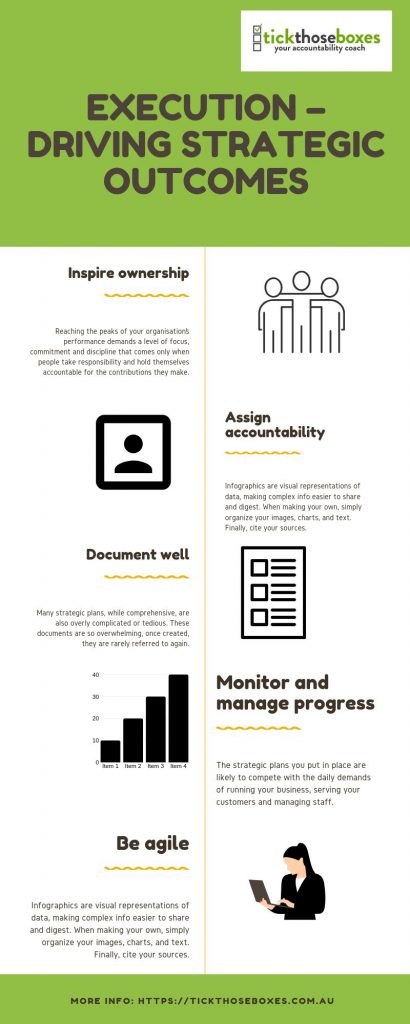
Accountability for Business Owners
Learn how accountability can help business owners build more sustainable
The Accountability Guy®

Have you ever attended a planning workshop, spending a day or more discussing essential issues and making resolutions, only to come back to work and fail to implement what you had agreed to? This is a common scenario and one that reflects why so often vision and strategy planning exercises fail to achieve their intended objectives.
No matter how well-conceived your plans, value is realised only when steps are taken to execute them. Your vision lays out your intended destination, your destination guides your strategy, and your policy determines necessary action. It’s making the right moves at the right time that ultimately lead to success. Turning vision into reality takes executing purposeful and deliberate actions at every step along the way.
Inspire ownership
Reaching the peaks of your organisation’s performance demands a level of focus, commitment and discipline that comes only when people take responsibility and hold themselves accountable for the contributions they make. Excellence is enabled by a passionate desire to succeed driven by a sense of personal ownership of the plan and the standard of results ultimately achieved.
Engaging your team in your planning process is essential to your ability to inspire ownership. Involving team members undoubtedly contribute to building a sense of ownership of your plans at every level of the organisation. What matters most is that people feel they have been given the opportunity to contribute their ideas about what needs to be done and how they or the team should go about it.
“Your vision lays out your intended destination; your destination guides your strategy and your strategy determines necessary action.”
People who feel respected and relevant are entirely more likely to be energised and engaged. In turn, they are more likely to want to make a difference and take ownership of their role.
Demonstrate respect and earn trust by listening to the insights and ideas people offer, give sincere consideration to suggestions made and communicate why you reach the decisions that you do. Assign clear accountability and empower people to do the job you need them to.
Assign accountability
Agreeing who is responsible for critical outcomes and specific initiatives is the first step towards holding people accountable for making it happen. Unless you have these commitments in place, it is all too easy to become distracted by the day to day and fail to deliver on your longer-term plans. Just as important is ensuring people understand who else on the team, they need to work closely with to achieve alignment and mutual objectives.
“While well-developed strategic plans will identify critical risks and potential obstacles, it’s somewhat inevitable that unforeseen challenges will arise.”
Provide ongoing clarity and coaching to support the members of your team to focus on the right priorities and approach their work in ways most likely to succeed. While well-developed strategic plans will identify critical risks and potential obstacles, it’s somewhat inevitable that unforeseen challenges will arise. When they do, particularly in circumstances of substantial or rapid change, guiding people to understand priorities, make effective decisions and leverage the resources available to them is typically essential.
Document well
Many strategic plans, while comprehensive, are also overly complicated or tedious. These documents are so overwhelming, once created, they are rarely referred to again. Typically, the problem lies not in the validity of the content, but the complexity and sheer volume of the information captured, making it challenging to reference or digest. These are the strategic plans lying at the bottom of desk drawers or filing cabinets in offices everywhere.
“Many strategic plans, while comprehensive, are also overly complex or verbose.”
Your strategic plan is a tool; one that can be used to focus your teams’ efforts and measure progress. Capture your ideas in ways that allow people to access and apply the information readily. For example, use fewer words and more pictures, checklists or bullet points to provide detail, models or charts to convey complex concepts and appendices for supporting information that some may need to refer to. Project or implementation plans should be used to capture the detail required to guide decision-making and achieve particular outcomes successfully.
Monitor and manage progress
The strategic plans you put in place are likely to compete with the daily demands of running your business, serving your customers and managing staff. For many leaders, this challenge of balancing focus on daily priorities with those that will enable success in the future is immense. It can be all too easy to spend each day achieving what is in front of us and demanding our attention. Many of the leaders I work with struggle to invest the time, resources or energy needed to execute strategy well.
“Many of the leaders I work with struggle to invest the time, resources or energy needed to execute strategy well.”
Creating time and space to focus on the achievement of longer-term objectives is essential. Determine and communicate when you will convene to review progress and determine priorities. Ensure every member of your team understands the progress reports they need to provide and outcomes they will be held to account for delivering on. Review and agree on next-step priorities regular to ensure you remain on track to achieving your vision at every step along the way.
Be agile
Even the best-laid plans may need to change. While focus and follow-through are essential to effective execution, so too is responding to the shifting landscape within which you are operating. While your vision may remain fixed, the strategies you deploy and initiatives you prioritise will likely change. Lead by example and encourage your team to maintain a keen awareness of the organisation you serve and be ready to adapt as required.

If you like what your reading and this resonates with you, as your ‘Accountability Coach’ I’ll keep you on track, so you keep those promises and commitments made to others and yourself.
If we do this right, you’ll increase your sales, service your clients better, make more money and work fewer hours. Now you can spend it with those that are most important and not doing work.
Visit my website to find how we can work together: https://tickthoseboxes.com.au/working-with-me
If you need help with your business, I work with entrepreneurial business owners, executives and their teams to ensure full accountability so they can meet obligations, promises and commitments made to others and themselves. My name is Darren Finkelstein: Accountability Coach, Business Advisor and Presenter.
For more info reach out to us at questions@tickthoseboxes.com.au

Darren Finkelstein, The Accountability Guy®, is the founder of TICK THOSE BOXES, a specialised accountability coaching practice. Darren is a formidable international accountability coach, business advisor, mentor, and author/speaker, fostering development and measurable results in entrepreneurship, leadership, and accountability. Darren’s tale is one of perseverance, self-reinvention, and resilience.
With compelling execution, Darren has empowered high-achieving individuals and teams from Australia and New Zealand to Latin America, Europe, Asia, the UK, and the US to embrace accountability; after all, it is your superpower.
Darren’s one-on-one and group coaching programs are based on his bestselling business book, “The Accountability Advantage – Play your best game” and the latest, release “NO’ – Building a life of choice without obligation”.
Darren has an impressive background in business, having held the role of “Manager of Commercial Markets” at Apple Australia during the Steve Jobs revolution.
He enthusiastically “walks the talk,” having also successfully sold and exited his lifestyle businesses, which served as the impetus for establishing his coaching and mentoring business.
Join Darren on this transformative quest to accomplish the remarkable.
Read Darren’s full bio here:
https://tickthoseboxes.com.au/about/

Know what to do first

know what to do next

know what to do more of

Learn how accountability can help business owners build more sustainable

Boost productivity and trust within your team. Unveil the power

Learn about Positive Accountability, see what it is, why you

Accountability drives success in so many ways. Whenever I coach

Are You Responsible or Accountable? The underlying principles undoubtedly apply

Discover why accountability is crucial for effective leadership. Learn how
Navigation
Learn More
Contact
Social Media
Copyright Darren Finkelstein 2022 | Privacy Policy | Terms and Conditions